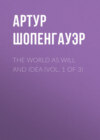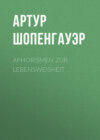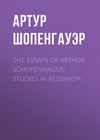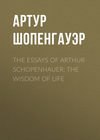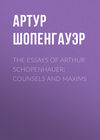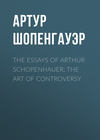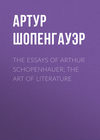Buch lesen: «The World as Will and Idea (Vol. 1 of 3)», Seite 16
Whoever now, has, after the manner referred to, become so absorbed and lost in the perception of nature that he only continues to exist as the pure knowing subject, becomes in this way directly conscious that, as such, he is the condition, that is, the supporter, of the world and all objective existence; for this now shows itself as dependent upon his existence. Thus he draws nature into himself, so that he sees it to be merely an accident of his own being. In this sense Byron says —
“Are not the mountains, waves, and skies, a part
Of me and of my soul, as I of them?”
But how shall he who feels this, regard himself as absolutely transitory, in contrast to imperishable nature? Such a man will rather be filled with the consciousness, which the Upanishad of the Veda expresses: Hæ omnes creaturæ in totum ego sum, et præter me aliud ens non est (Oupnek'hat, i. 122).48
§ 35. In order to gain a deeper insight into the nature of the world, it is absolutely necessary that we should learn to distinguish the will as thing-in-itself from its adequate objectivity, and also the different grades in which this appears more and more distinctly and fully, i. e., the Ideas themselves, from the merely phenomenal existence of these Ideas in the forms of the principle of sufficient reason, the restricted method of knowledge of the individual. We shall then agree with Plato when he attributes actual being only to the Ideas, and allows only an illusive, dream-like existence to things in space and time, the real world for the individual. Then we shall understand how one and the same Idea reveals itself in so many phenomena, and presents its nature only bit by bit to the individual, one side after another. Then we shall also distinguish the Idea itself from the way in which its manifestation appears in the observation of the individual, and recognise the former as essential and the latter as unessential. Let us consider this with the help of examples taken from the most insignificant things, and also from the greatest. When the clouds move, the figures which they form are not essential, but indifferent to them; but that as elastic vapour they are pressed together, drifted along, spread out, or torn asunder by the force of the wind: this is their nature, the essence of the forces which objectify themselves in them, the Idea; their actual forms are only for the individual observer. To the brook that flows over stones, the eddies, the waves, the foam-flakes which it forms are indifferent and unessential; but that it follows the attraction of gravity, and behaves as inelastic, perfectly mobile, formless, transparent fluid: this is its nature; this, if known through perception, is its Idea; these accidental forms are only for us so long as we know as individuals. The ice on the window-pane forms itself into crystals according to the laws of crystallisation, which reveal the essence of the force of nature that appears here, exhibit the Idea; but the trees and flowers which it traces on the pane are unessential, and are only there for us. What appears in the clouds, the brook, and the crystal is the weakest echo of that will which appears more fully in the plant, more fully still in the beast, and most fully in man. But only the essential in all these grades of its objectification constitutes the Idea; on the other hand, its unfolding or development, because broken up in the forms of the principle of sufficient reason into a multiplicity of many-sided phenomena, is unessential to the Idea, lies merely in the kind of knowledge that belongs to the individual and has reality only for this. The same thing necessarily holds good of the unfolding of that Idea which is the completest objectivity of will. Therefore, the history of the human race, the throng of events, the change of times, the multifarious forms of human life in different lands and countries, all this is only the accidental form of the manifestation of the Idea, does not belong to the Idea itself, in which alone lies the adequate objectivity of the will, but only to the phenomenon which appears in the knowledge of the individual, and is just as foreign, unessential, and indifferent to the Idea itself as the figures which they assume are to the clouds, the form of its eddies and foam-flakes to the brook, or its trees and flowers to the ice.
To him who has thoroughly grasped this, and can distinguish between the will and the Idea, and between the Idea and its manifestation, the events of the world will have significance only so far as they are the letters out of which we may read the Idea of man, but not in and for themselves. He will not believe with the vulgar that time may produce something actually new and significant; that through it, or in it, something absolutely real may attain to existence, or indeed that it itself as a whole has beginning and end, plan and development, and in some way has for its final aim the highest perfection (according to their conception) of the last generation of man, whose life is a brief thirty years. Therefore he will just as little, with Homer, people a whole Olympus with gods to guide the events of time, as, with Ossian, he will take the forms of the clouds for individual beings; for, as we have said, both have just as much meaning as regards the Idea which appears in them. In the manifold forms of human life and in the unceasing change of events, he will regard the Idea only as the abiding and essential, in which the will to live has its fullest objectivity, and which shows its different sides in the capacities, the passions, the errors and the excellences of the human race; in self-interest, hatred, love, fear, boldness, frivolity, stupidity, slyness, wit, genius, and so forth, all of which crowding together and combining in thousands of forms (individuals), continually create the history of the great and the little world, in which it is all the same whether they are set in motion by nuts or by crowns. Finally, he will find that in the world it is the same as in the dramas of Gozzi, in all of which the same persons appear, with like intention, and with a like fate; the motives and incidents are certainly different in each piece, but the spirit of the incidents is the same; the actors in one piece know nothing of the incidents of another, although they performed in it themselves; therefore, after all experience of former pieces, Pantaloon has become no more agile or generous, Tartaglia no more conscientious, Brighella no more courageous, and Columbine no more modest.
Suppose we were allowed for once a clearer glance into the kingdom of the possible, and over the whole chain of causes and effects; if the earth-spirit appeared and showed us in a picture all the greatest men, enlighteners of the world, and heroes, that chance destroyed before they were ripe for their work; then the great events that would have changed the history of the world and brought in periods of the highest culture and enlightenment, but which the blindest chance, the most insignificant accident, hindered at the outset; lastly, the splendid powers of great men, that would have enriched whole ages of the world, but which, either misled by error or passion, or compelled by necessity, they squandered uselessly on unworthy or unfruitful objects, or even wasted in play. If we saw all this, we would shudder and lament at the thought of the lost treasures of whole periods of the world. But the earth-spirit would smile and say, “The source from which the individuals and their powers proceed is inexhaustible and unending as time and space; for, like these forms of all phenomena, they also are only phenomena, visibility of the will. No finite measure can exhaust that infinite source; therefore an undiminished eternity is always open for the return of any event or work that was nipped in the bud. In this world of phenomena true loss is just as little possible as true gain. The will alone is; it is the thing in-itself, and the source of all these phenomena. Its self-knowledge and its assertion or denial, which is then decided upon, is the only event in-itself.”49
§ 36. History follows the thread of events; it is pragmatic so far as it deduces them in accordance with the law of motivation, a law that determines the self-manifesting will wherever it is enlightened by knowledge. At the lowest grades of its objectivity, where it still acts without knowledge, natural science, in the form of etiology, treats of the laws of the changes of its phenomena, and, in the form of morphology, of what is permanent in them. This almost endless task is lightened by the aid of concepts, which comprehend what is general in order that we may deduce what is particular from it. Lastly, mathematics treats of the mere forms, time and space, in which the Ideas, broken up into multiplicity, appear for the knowledge of the subject as individual. All these, of which the common name is science, proceed according to the principle of sufficient reason in its different forms, and their theme is always the phenomenon, its laws, connections, and the relations which result from them. But what kind of knowledge is concerned with that which is outside and independent of all relations, that which alone is really essential to the world, the true content of its phenomena, that which is subject to no change, and therefore is known with equal truth for all time, in a word, the Ideas, which are the direct and adequate objectivity of the thing in-itself, the will? We answer, Art, the work of genius. It repeats or reproduces the eternal Ideas grasped through pure contemplation, the essential and abiding in all the phenomena of the world; and according to what the material is in which it reproduces, it is sculpture or painting, poetry or music. Its one source is the knowledge of Ideas; its one aim the communication of this knowledge. While science, following the unresting and inconstant stream of the fourfold forms of reason and consequent, with each end attained sees further, and can never reach a final goal nor attain full satisfaction, any more than by running we can reach the place where the clouds touch the horizon; art, on the contrary, is everywhere at its goal. For it plucks the object of its contemplation out of the stream of the world's course, and has it isolated before it. And this particular thing, which in that stream was a small perishing part, becomes to art the representative of the whole, an equivalent of the endless multitude in space and time. It therefore pauses at this particular thing; the course of time stops; the relations vanish for it; only the essential, the Idea, is its object. We may, therefore, accurately define it as the way of viewing things independent of the principle of sufficient reason, in opposition to the way of viewing them which proceeds in accordance with that principle, and which is the method of experience and of science. This last method of considering things may be compared to a line infinitely extended in a horizontal direction, and the former to a vertical line which cuts it at any point. The method of viewing things which proceeds in accordance with the principle of sufficient reason is the rational method, and it alone is valid and of use in practical life and in science. The method which looks away from the content of this principle is the method of genius, which is only valid and of use in art. The first is the method of Aristotle; the second is, on the whole, that of Plato. The first is like the mighty storm, that rushes along without beginning and without aim, bending, agitating, and carrying away everything before it; the second is like the silent sunbeam, that pierces through the storm quite unaffected by it. The first is like the innumerable showering drops of the waterfall, which, constantly changing, never rest for an instant; the second is like the rainbow, quietly resting on this raging torrent. Only through the pure contemplation described above, which ends entirely in the object, can Ideas be comprehended; and the nature of genius consists in pre-eminent capacity for such contemplation. Now, as this requires that a man should entirely forget himself and the relations in which he stands, genius is simply the completest objectivity, i. e., the objective tendency of the mind, as opposed to the subjective, which is directed to one's own self – in other words, to the will. Thus genius is the faculty of continuing in the state of pure perception, of losing oneself in perception, and of enlisting in this service the knowledge which originally existed only for the service of the will; that is to say, genius is the power of leaving one's own interests, wishes, and aims entirely out of sight, thus of entirely renouncing one's own personality for a time, so as to remain pure knowing subject, clear vision of the world; and this not merely at moments, but for a sufficient length of time, and with sufficient consciousness, to enable one to reproduce by deliberate art what has thus been apprehended, and “to fix in lasting thoughts the wavering images that float before the mind.” It is as if, when genius appears in an individual, a far larger measure of the power of knowledge falls to his lot than is necessary for the service of an individual will; and this superfluity of knowledge, being free, now becomes subject purified from will, a clear mirror of the inner nature of the world. This explains the activity, amounting even to disquietude, of men of genius, for the present can seldom satisfy them, because it does not fill their consciousness. This gives them that restless aspiration, that unceasing desire for new things, and for the contemplation of lofty things, and also that longing that is hardly ever satisfied, for men of similar nature and of like stature, to whom they might communicate themselves; whilst the common mortal, entirely filled and satisfied by the common present, ends in it, and finding everywhere his like, enjoys that peculiar satisfaction in daily life that is denied to genius.
Imagination has rightly been recognised as an essential element of genius; it has sometimes even been regarded as identical with it; but this is a mistake. As the objects of genius are the eternal Ideas, the permanent, essential forms of the world and all its phenomena, and as the knowledge of the Idea is necessarily knowledge through perception, is not abstract, the knowledge of the genius would be limited to the Ideas of the objects actually present to his person, and dependent upon the chain of circumstances that brought these objects to him, if his imagination did not extend his horizon far beyond the limits of his actual personal existence, and thus enable him to construct the whole out of the little that comes into his own actual apperception, and so to let almost all possible scenes of life pass before him in his own consciousness. Further, the actual objects are almost always very imperfect copies of the Ideas expressed in them; therefore the man of genius requires imagination in order to see in things, not that which Nature has actually made, but that which she endeavoured to make, yet could not because of that conflict of her forms among themselves which we referred to in the last book. We shall return to this farther on in treating of sculpture. The imagination then extends the intellectual horizon of the man of genius beyond the objects which actually present themselves to him, both as regards quality and quantity. Therefore extraordinary strength of imagination accompanies, and is indeed a necessary condition of genius. But the converse does not hold, for strength of imagination does not indicate genius; on the contrary, men who have no touch of genius may have much imagination. For as it is possible to consider a real object in two opposite ways, purely objectively, the way of genius grasping its Idea, or in the common way, merely in the relations in which it stands to other objects and to one's own will, in accordance with the principle of sufficient reason, it is also possible to perceive an imaginary object in both of these ways. Regarded in the first way, it is a means to the knowledge of the Idea, the communication of which is the work of art; in the second case, the imaginary object is used to build castles in the air congenial to egotism and the individual humour, and which for the moment delude and gratify; thus only the relations of the phantasies so linked together are known. The man who indulges in such an amusement is a dreamer; he will easily mingle those fancies that delight his solitude with reality, and so unfit himself for real life: perhaps he will write them down, and then we shall have the ordinary novel of every description, which entertains those who are like him and the public at large, for the readers imagine themselves in the place of the hero, and then find the story very agreeable.
The common mortal, that manufacture of Nature which she produces by the thousand every day, is, as we have said, not capable, at least not continuously so, of observation that in every sense is wholly disinterested, as sensuous contemplation, strictly so called, is. He can turn his attention to things only so far as they have some relation to his will, however indirect it may be. Since in this respect, which never demands anything but the knowledge of relations, the abstract conception of the thing is sufficient, and for the most part even better adapted for use; the ordinary man does not linger long over the mere perception, does not fix his attention long on one object, but in all that is presented to him hastily seeks merely the concept under which it is to be brought, as the lazy man seeks a chair, and then it interests him no further. This is why he is so soon done with everything, with works of art, objects of natural beauty, and indeed everywhere with the truly significant contemplation of all the scenes of life. He does not linger; only seeks to know his own way in life, together with all that might at any time become his way. Thus he makes topographical notes in the widest sense; over the consideration of life itself as such he wastes no time. The man of genius, on the other hand, whose excessive power of knowledge frees it at times from the service of will, dwells on the consideration of life itself, strives to comprehend the Idea of each thing, not its relations to other things; and in doing this he often forgets to consider his own path in life, and therefore for the most part pursues it awkwardly enough. While to the ordinary man his faculty of knowledge is a lamp to lighten his path, to the man of genius it is the sun which reveals the world. This great diversity in their way of looking at life soon becomes visible in the outward appearance both of the man of genius and of the ordinary mortal. The man in whom genius lives and works is easily distinguished by his glance, which is both keen and steady, and bears the stamp of perception, of contemplation. This is easily seen from the likenesses of the few men of genius whom Nature has produced here and there among countless millions. On the other hand, in the case of an ordinary man, the true object of his contemplation, what he is prying into, can be easily seen from his glance, if indeed it is not quite stupid and vacant, as is generally the case. Therefore the expression of genius in a face consists in this, that in it a decided predominance of knowledge over will is visible, and consequently there also shows itself in it a knowledge that is entirely devoid of relation to will, i. e., pure knowing. On the contrary, in ordinary countenances there is a predominant expression of will; and we see that knowledge only comes into activity under the impulse of will, and thus is directed merely by motives.
Since the knowledge that pertains to genius, or the knowledge of Ideas, is that knowledge which does not follow the principle of sufficient reason, so, on the other hand, the knowledge which does follow that principle is that which gives us prudence and rationality in life, and which creates the sciences. Thus men of genius are affected with the deficiencies entailed in the neglect of this latter kind of knowledge. Yet what I say in this regard is subject to the limitation that it only concerns them in so far as and while they are actually engaged in that kind of knowledge which is peculiar to genius; and this is by no means at every moment of their lives, for the great though spontaneous exertion which is demanded for the comprehension of Ideas free from will must necessarily relax, and there are long intervals during which men of genius are placed in very much the same position as ordinary mortals, both as regards advantages and deficiencies. On this account the action of genius has always been regarded as an inspiration, as indeed the name indicates, as the action of a superhuman being distinct from the individual himself, and which takes possession of him only periodically. The disinclination of men of genius to direct their attention to the content of the principle of sufficient reason will first show itself, with regard to the ground of being, as dislike of mathematics; for its procedure is based upon the most universal forms of the phenomenon space and time, which are themselves merely modes of the principle of sufficient reason, and is consequently precisely the opposite of that method of thought which seeks merely the content of the phenomenon, the Idea which expresses itself in it apart from all relations. The logical method of mathematics is also antagonistic to genius, for it does not satisfy but obstructs true insight, and presents merely a chain of conclusions in accordance with the principle of the ground of knowing. The mental faculty upon which it makes the greatest claim is memory, for it is necessary to recollect all the earlier propositions which are referred to. Experience has also proved that men of great artistic genius have no faculty for mathematics; no man was ever very distinguished for both. Alfieri relates that he was never able to understand the fourth proposition of Euclid. Goethe was constantly reproached with his want of mathematical knowledge by the ignorant opponents of his theory of colours. Here certainly, where it was not a question of calculation and measurement upon hypothetical data, but of direct knowledge by the understanding of causes and effects, this reproach was so utterly absurd and inappropriate, that by making it they have exposed their entire want of judgment, just as much as by the rest of their ridiculous arguments. The fact that up to the present day, nearly half a century after the appearance of Goethe's theory of colours, even in Germany the Newtonian fallacies still have undisturbed possession of the professorial chair, and men continue to speak quite seriously of the seven homogeneous rays of light and their different refrangibility, will some day be numbered among the great intellectual peculiarities of men generally, and especially of Germans. From the same cause as we have referred to above, may be explained the equally well-known fact that, conversely, admirable mathematicians have very little susceptibility for works of fine art. This is very naïvely expressed in the well-known anecdote of the French mathematician, who, after having read Racine's “Iphigenia,” shrugged his shoulders and asked, “Qu'est ce que cela prouve?” Further, as quick comprehension of relations in accordance with the laws of causality and motivation is what specially constitutes prudence or sagacity, a prudent man, so far as and while he is so, will not be a genius, and a man of genius, so far as and while he is so, will not be a prudent man. Lastly, perceptive knowledge generally, in the province of which the Idea always lies, is directly opposed to rational or abstract knowledge, which is guided by the principle of the ground of knowing. It is also well known that we seldom find great genius united with pre-eminent reasonableness; on the contrary, persons of genius are often subject to violent emotions and irrational passions. But the ground of this is not weakness of reason, but partly unwonted energy of that whole phenomenon of will – the man of genius – which expresses itself through the violence of all his acts of will, and partly preponderance of the knowledge of perception through the senses and understanding over abstract knowledge, producing a decided tendency to the perceptible, the exceedingly lively impressions of which so far outshine colourless concepts, that they take their place in the guidance of action, which consequently becomes irrational. Accordingly the impression of the present moment is very strong with such persons, and carries them away into unconsidered action, violent emotions and passions. Moreover, since, in general, the knowledge of persons of genius has to some extent freed itself from the service of will, they will not in conversation think so much of the person they are addressing as of the thing they are speaking about, which is vividly present to them; and therefore they are likely to judge or narrate things too objectively for their own interests; they will not pass over in silence what would more prudently be concealed, and so forth. Finally, they are given to soliloquising, and in general may exhibit certain weaknesses which are actually akin to madness. It has often been remarked that there is a side at which genius and madness touch, and even pass over into each other, and indeed poetical inspiration has been called a kind of madness: amabilis insania, Horace calls it (Od. iii. 4), and Wieland in the introduction to “Oberon” speaks of it as “amiable madness.” Even Aristotle, as quoted by Seneca (De Tranq. Animi, 15, 16), is reported to have said: Nullum magnum ingenium sine mixtura dementiæ fuit. Plato expresses it in the figure of the dark cave, referred to above (De Rep. 7), when he says: “Those who, outside the cave, have seen the true sunlight and the things that have true being (Ideas), cannot afterwards see properly down in the cave, because their eyes are not accustomed to the darkness; they cannot distinguish the shadows, and are jeered at for their mistakes by those who have never left the cave and its shadows.” In the “Phædrus” also (p. 317), he distinctly says that there can be no true poet without a certain madness; in fact, (p. 327), that every one appears mad who recognises the eternal Ideas in fleeting things. Cicero also quotes: Negat enim sine furore, Democritus, quemquam poetam magnum esse posse; quod idem dicit Plato (De Divin., i. 37). And, lastly, Pope says —
“Great wits to madness sure are near allied,
And thin partitions do their bounds divide.”
Especially instructive in this respect is Goethe's “Torquato Tasso,” in which he shows us not only the suffering, the martyrdom of genius as such, but also how it constantly passes into madness. Finally, the fact of the direct connection of genius and madness is established by the biographies of great men of genius, such as Rousseau, Byron, and Alfieri, and by anecdotes from the lives of others. On the other hand, I must mention that, by a diligent search in lunatic asylums, I have found individual cases of patients who were unquestionably endowed with great talents, and whose genius distinctly appeared through their madness, which, however, had completely gained the upper hand. Now this cannot be ascribed to chance, for on the one hand the number of mad persons is relatively very small, and on the other hand a person of genius is a phenomenon which is rare beyond all ordinary estimation, and only appears in nature as the greatest exception. It will be sufficient to convince us of this if we compare the number of really great men of genius that the whole of civilised Europe has produced, both in ancient and modern times, with the two hundred and fifty millions who are always living in Europe, and who change entirely every thirty years. In estimating the number of men of outstanding genius, we must of course only count those who have produced works which have retained through all time an enduring value for mankind. I shall not refrain from mentioning, that I have known some persons of decided, though not remarkable, mental superiority, who also showed a slight trace of insanity. It might seem from this that every advance of intellect beyond the ordinary measure, as an abnormal development, disposes to madness. In the meantime, however, I will explain as briefly as possible my view of the purely intellectual ground of the relation between genius and madness, for this will certainly assist the explanation of the real nature of genius, that is to say, of that mental endowment which alone can produce genuine works of art. But this necessitates a brief explanation of madness itself.50
A clear and complete insight into the nature of madness, a correct and distinct conception of what constitutes the difference between the sane and the insane, has, as far as I know, not as yet been found. Neither reason nor understanding can be denied to madmen, for they talk and understand, and often draw very accurate conclusions; they also, as a rule, perceive what is present quite correctly, and apprehend the connection between cause and effect. Visions, like the phantasies of delirium, are no ordinary symptom of madness: delirium falsifies perception, madness the thoughts. For the most part, madmen do not err in the knowledge of what is immediately present; their raving always relates to what is absent and past, and only through these to their connection with what is present. Therefore it seems to me that their malady specially concerns the memory; not indeed that memory fails them entirely, for many of them know a great deal by heart, and sometimes recognise persons whom they have not seen for a long time; but rather that the thread of memory is broken, the continuity of its connection destroyed, and no uniformly connected recollection of the past is possible. Particular scenes of the past are known correctly, just like the particular present; but there are gaps in their recollection which they fill up with fictions, and these are either always the same, in which case they become fixed ideas, and the madness that results is called monomania or melancholy; or they are always different, momentary fancies, and then it is called folly, fatuitas. This is why it is so difficult to find out their former life from lunatics when they enter an asylum. The true and the false are always mixed up in their memory. Although the immediate present is correctly known, it becomes falsified through its fictitious connection with an imaginary past; they therefore regard themselves and others as identical with persons who exist only in their imaginary past; they do not recognise some of their acquaintances at all, and thus while they perceive correctly what is actually present, they have only false conceptions of its relations to what is absent. If the madness reaches a high degree, there is complete absence of memory, so that the madman is quite incapable of any reference to what is absent or past, and is only determined by the caprice of the moment in connection with the fictions which, in his mind, fill the past. In such a case, we are never for a moment safe from violence or murder, unless we constantly make the madman aware of the presence of superior force. The knowledge of the madman has this in common with that of the brute, both are confined to the present. What distinguishes them is that the brute has really no idea of the past as such, though the past acts upon it through the medium of custom, so that, for example, the dog recognises its former master even after years, that is to say, it receives the wonted impression at the sight of him; but of the time that has passed since it saw him it has no recollection. The madman, on the other hand, always carries about in his reason an abstract past, but it is a false past, which exists only for him, and that either constantly, or only for the moment. The influence of this false past prevents the use of the true knowledge of the present which the brute is able to make. The fact that violent mental suffering or unexpected and terrible calamities should often produce madness, I explain in the following manner. All such suffering is as an actual event confined to the present. It is thus merely transitory, and is consequently never excessively heavy; it only becomes unendurably great when it is lasting pain; but as such it exists only in thought, and therefore lies in the memory. If now such a sorrow, such painful knowledge or reflection, is so bitter that it becomes altogether unbearable, and the individual is prostrated under it, then, terrified Nature seizes upon madness as the last resource of life; the mind so fearfully tortured at once destroys the thread of its memory, fills up the gaps with fictions, and thus seeks refuge in madness from the mental suffering that exceeds its strength, just as we cut off a mortified limb and replace it with a wooden one. The distracted Ajax, King Lear, and Ophelia may be taken as examples; for the creations of true genius, to which alone we can refer here, as universally known, are equal in truth to real persons; besides, in this case, frequent actual experience shows the same thing. A faint analogy of this kind of transition from pain to madness is to be found in the way in which all of us often seek, as it were mechanically, to drive away a painful thought that suddenly occurs to us by some loud exclamation or quick movement – to turn ourselves from it, to distract our minds by force.
